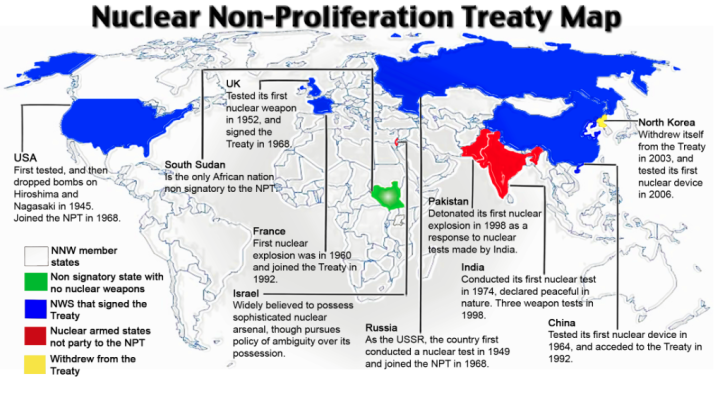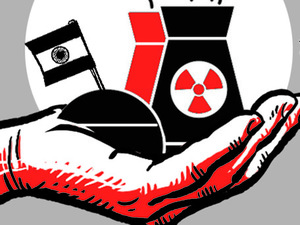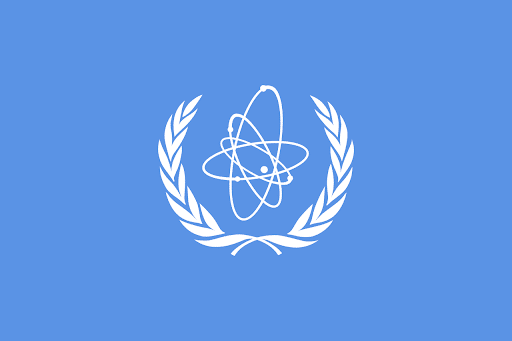Context: The US President has warned that Russia may use nuclear weapons to pursue its interests, thus violating the peaceful regime of non-nuclear proliferation and how India is playing its card.
The spread of nuclear weapons, fissionable materials, and weapons employing Nuclear Technology and information to countries that are not signatories to the Nuclear Non-Proliferation Treaty is known as Nuclear proliferation
Abstract : Nuclear Non-proliferation treaty and how India is dealing with non proliferation amidst current Geopolitics. What made India not to join NPT and how India is currently dealing with it.
Treaty on the Non-Proliferation of Nuclear Weapons: A Brief History

- 1945 :Hiroshima and Nagasaki incident.
- 1946: Combined effort to safeguard for peaceful use only.
- 1949: Combined effort terminated.
- 1953: US President Dwight D → UNGA → Peaceful regime for Nuclear power.
- 1957: IAEA formed (only surveillance, assistance and safeguard of nuclear energy.)
- 1964: China’s Nuclear test
- 1970: NPT signed and adopted.
- Review of treaty after 25 years
- 1995: Extended infinite.
OBJECTIVES
Stop the spread of nuclear weapons.Stop the spread of nuclear weapons technology.Encourage collaboration in the peaceful use of nuclear energy.Total disarmament.Nuclear weapon nations are subject to binding provisions.Measures to Instill Confidence.IAEA assistance is available.
India’s Nuclear Doctrine
A Nuclear Doctrine specifies how a nuclear weapon state will use its nuclear weapons in both peace and conflict.
Homi Jehangir Bhabha founded the Tata Institute of Fundamental Research, a nuclear research institute, in 1944.
The Chinese attack on India in 1962 provided momentum for the development of nuclear weapons.
India declined to sign the Nuclear Non-Proliferation Treaty in 1968. (NPT).
1974-Operation Smiling Buddha, also known as the Pokhran I nuclear test.
Pokhran II nuclear test, 1998.
Announcement of India’s Nuclear Doctrine and NFU in 1999
2003-Implementation of the Nuclear Command Authority Doctrine of ‘No First Use‘ (NFU) of nuclear weapons (1998) – nuclear weapons may only be used in response for a nuclear assault on Indian territory or on Indian forces elsewhere.
 Economic Times
Economic Times
Benefits
- Restricted firearm programme
- Minimum likelihood of conflict.
- There will be no rewards for quiet neighbours.
- Potential admission to the NSC and UNSC
Limitations
- Soft state projection
- Such a policy does not exist in Pakistan.
- silent on the use by non-state actors
NPT Multilateral Treaty
The NPT is a multinational pact with three components aimed at controlling the spread of nuclear weapons: (1) non-proliferation, (2) disarmament, and (3) peaceful use of nuclear energy. According to the Treaty, nuclear weapon states (NWS) are those that created and detonated a nuclear explosive device prior to January 1, 1967.
As a result, all other states are considered non-nuclear weapon states (NNWS). China, France, Russia, the United Kingdom, and the United States are the five nuclear weapon states.
The Treaty has no bearing on states’ rights to explore, generate, and use nuclear energy for peaceful reasons.The IAEA monitors NNWS compliance with NPT pledges not to acquire nuclear weapons.
The pact does not apply to South Sudan, India, Israel, or Pakistan.Because the treaty confines NWS status to nations that “produced and detonated a nuclear weapon or other nuclear explosive device prior to 1 January 1967,” these governments must accede to the treaty as NNWS.
Joining the pact as NNWS would compel India, Israel, and Pakistan, all of whom are known or believed to have nuclear weapons, to dismantle their nuclear weapons and place their nuclear materials under international safeguards. South Africa used this route to membership in 1991.
Nuclear Weapons Guarantee
- Despite the UN Security Council’s ban on nuclear weapons, a message is being delivered that nuclear weapons provide security.
- Despite their isolation, Iran and North Korea have avoided conflict until now.
- In contrast, nuclear-free Ukraine and Libya have been attacked.
- Nuclear weapon nations stalled nuclear disarmament discussions.
- Brought in the Nuclear Non-Proliferation Treaty (NPT) to grant itself the right to have nuclear weapons in perpetuity, while non-nuclear countries rely on security assurances.
- Such moves would exacerbate the nuclear arms race because countries would begin to consider nuclear weapons as a guarantee of security.
India’s View
India reiterates its commitment to the objective of a nuclear-weapon-free world. India believes that this goal can be achieved through a step-by-step process underpinned by a universal commitment and an agreed global and non-discriminatory multilateral framework, as outlined in India’s Working Paper titled “Nuclear Disarmament,” which was submitted to the UN General Assembly and the Conference on Disarmament. In this context, India supports the start of discussions on a comprehensive Nuclear Weapons Convention at the Conference on Disarmament, the world’s sole multilateral disarmament negotiating mechanism based on agreement. India remains ready to collaborate with all UN Member States to achieve the goal of a nuclear-free world.













